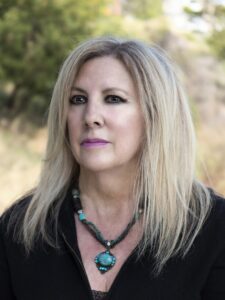American Confidential, Tennessee Williams, and the Role of Place
By Deanne Stillman
My books are generally place-based stories of war and peace in the real and mythological West. In my view, the personal isn’t just political, as the saying goes, it’s geographic as well. You might not think that geography – or landscape, or even the idea of it – has anything at all to do with the story I tell in American Confidential, about Lee Harvey Oswald and his mother and how together, they formed an inadvertent “conspiracy of one.” But it does – and that was one of the reasons I wanted to write this book.
I already knew that Oswald had lived in a series of places – New Orleans (his birthplace, and his mother’s too), Fort Worth, the Bronx and Dallas. But over the years, as I thought about the assassination of JFK and read many of the books on the subject– one of America’s most notorious crimes – I realized something was missing from these accounts. I wanted to understand how the places that Oswald lived – the natural and built environments – shaped and informed his behavior. In all of my books, place is a driver of story and sometimes a character itself. The more I looked into Oswald’s story, the more apparent it became to me that the geographic facts of his life had not been explored in the countless examinations of his life. Nor had the mythology of the places where he had lived been looked at with a consideration of their possible impact on the young man whose final act – and yes, I believe he acted alone – is the subject of never-ending investigation. And so those are some of the things that I endeavored to excavate in American Confidential.
Let’s start with New Orleans, land of origin for Lee and his mother Marguerite. I’m a long-time fan of Tennessee Williams. I love his plays and they have informed my writing in various ways. While writing a previous book, Desert Reckoning, (which I’ve spoken about at the SDWF), it occurred to me while listening to a recording of a desperate negotiation between a cop and a cop killer that a character involved in a stand-off with dozens of members of law enforcement agencies could have been a figure in one of Tennessee’s plays. That realizationopened up a line of thinking for me as I wrote, and I spoke about it on CSpan Book TV [https://www.c-span.org/video/?313043-1/desert-reckoningV]. As I started to consider New Orleans and its role in Lee’s life, I immediately flashed on “A Streetcar Named Desire,” the classic Williams play about troubledBlanche duBois, her temperamental brother-in-law Stanley Kowalski, and Blanche’s beleaguered sister Stella.
The play takes place in New Orleans where Tennessee himself once lived for some time. He knew its rhythms as well as anyone and it wasn’t for nothing that one of the city’s streetcar lines became a metaphor for the play. Before I started writing American Confidential, I knew that Lee’s maternal grandfather was a streetcar conductor. As I started thinking about the play and its focus on a working class family not unlike Lee’s, I started to wonder which streetcar line Lee’s maternal grandfather, John Claverie, worked on. After a fair amount of research, I determined that it was most likely the line named “Desire.” In fact, the “Desire” line ran right past the house where Lee’s mother Marguerite and her siblings were raised. This was amazing to me; once again, it was Tennessee Williams to the rescue. I started thinking about the clanging of the streetcar outside the family home, the family’s hopes and dreamsand desires, and I pondered how certain legacies are passed on and how they resonate.
I came to realize that John Claverie’s job had a profound influence on Lee. You see, when Lee was about eleven or twelve years old, he and his mother moved to the Bronx to live with his older half-brother. Once there, Lee developed a fondness for the subway, often taking the Pelham line into Manhattan, transferring to various lines, and riding them all over town. He carried a map of NYC subway routes and he would proudly show it off to his brother, and I imagined him tracing the pathsto various preferred destinations and landmarks. It occurred to me that although Lee’s grandfather had died before he was born, his legacy had indeed been passed on, perhaps by way of stories from his mother about what her father did for a living, fond memories of his retirement celebration, and how his years of labor on the Desire line supported this New Orleans family. We all carry our family histories in one way or another, and whether or not he realized it, Lee may have connected with his family’s past via riding the rails in New York City, acting out his own longings and desires.
Another thing that occurred to me as I was writing was that both Lee and his mother Marguerite were very much informed by the myth of the Wild West. Which is to say, the idea that in America, no matter who you are or where you came from, you can always move somewhere else and start over. By the time he was seventeen years old, Lee and his mother had relocatedtwenty times, the living embodiment of Wallace Stegner’s statement that “The American community is an overnight camp.” Marguerite and Lee were essentially nomads, although rooted in certain places by way of heritage (Lee’s name came from “Robert E. Lee” and so did his father’s and his older brother’s), fueled by the national dream of rebirth and new beginnings.
The more I looked into the story of Lee Harvey Oswald, there was further amplification of how our fable of the Wild West played out in it. A couple of things were especially noteworthy in this regard. For instance, while visiting his estranged wife Marina on the night before the assassination, Leewhistled “High Noon,” the eponymous theme song from the movie, memorably crooned by Frankie Laine. It’s a great western and a great song, and no doubt, was whistled by many over the years as they made their way through daily tasks and endeavors, taking them right into the Wild West and a fantasy of dreams. Considering that Lee could have been whistling any number of other songs on that evening, I was struck by the fact that it was this one, and I began to imagine him whistling this in the home where Marina was living as he pondered what was to come on the following day. He had been storing his rifle in the garage there and when he failed to reunite with his wife that night – the song has the lyric “Do not forsake me, O my darling” – he picked up the weapon on the following morning and left for work, never to return.
I was also struck by the fact that on the morning before the assassination, JFK emerged with his entourage from the Hotel Texas, under a marquee that said “Welcome to Fort Worth/Where the West begins.” Indeed, this is as true a slogan for a place that I know of, and in my book, I recount Fort Worth’s history from the Native American era to its days as a hideout for Butch Cassidy and his crew to its current role as a locale that invokes history through re-enactments of cattle drives and outlaw shoot-outs. What happened in Dallas on November 22, 1963 will always remain a subject of fascination and debate, and considering that the cataclysmic event of that day changed America in ways that still reverberate (also explored in my book), that is as it should be. But we should always bear in mind that there are certain myths and beliefs that have shaped this nation, for better and for worse, and the dream of the frontier – rephrased under JFK with his vision of a “new frontier,” meaning not land but space – lives on every time there is a moon landing or vehicles are sent into the galaxies to see what lies beyond. That is something that could not be destroyed sixty years ago, and that’s where my book ends: out there in thebeyond, a new Wild West of unlimited promise, depending on how we pursue our longings and desires.
About the Author:
 Deanne Stillman is a widely published, critically acclaimed writer. Her books include American Confidential (“brims with jewels” – T. Jefferson Parker); Blood Brothers (starred review, Kirkus, praised by Douglas Brinkley); Desert Reckoning (Spur Award winner, Newsweek rave); Mustang (LA Times “best book of the year,” praised by Tony Hillerman), and Twentynine Palms (LA Times “best book of the year,” “A strange and brilliant story by an important American writer” – Hunter Thompson).
Deanne Stillman is a widely published, critically acclaimed writer. Her books include American Confidential (“brims with jewels” – T. Jefferson Parker); Blood Brothers (starred review, Kirkus, praised by Douglas Brinkley); Desert Reckoning (Spur Award winner, Newsweek rave); Mustang (LA Times “best book of the year,” praised by Tony Hillerman), and Twentynine Palms (LA Times “best book of the year,” “A strange and brilliant story by an important American writer” – Hunter Thompson).
Purchase American Confidential from Warwick’s here.




